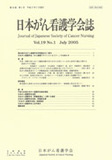Japanese
English
- 販売していません
- Abstract 文献概要
- 参考文献 Reference
- サイト内被引用 Cited by
要旨
本研究は,外来の場において,または短期入院を繰り返しながら,がん患者が治療を継続する中で認識している困難・対処・適応の関係性について構造方程式モデリングを用いて検討した.
基礎的研究(片桐ら,2001)をもとにがん患者の治療継続に伴う困難・対処・適応を問う質問紙を作成し,全国14カ所のがん専門病院および一般病院の外来または短期入院病棟で治療を受けているがん患者350名に質問紙を配布し,275名(有効回収率78.6%)より回収した.
第1段階として,困難・対処・適応の全項目について,探索的因子分析(最尤法,プロマックス回転)を行った.その結果,困難は【病気や治療に伴う困難感】と【治療環境の不備】の2因子,対処は【生活上の具体的な工夫】【病気への前向きな気持ち】の2因子,適応は【病気による人生の意味の深まり】の1因子,計5因子が抽出された.
次に,構造方程式モデリングを用いて5因子間の関係性を検討した.モデルの修正において,対処と適応の因子の潜在変数として【治療継続への対処過程】を設定した.その結果,【治療環境の不備】から【治療継続への対処過程】への直接効果ではパス係数は負の値を示し,【病気や治療に伴う困難感】を媒介とした間接効果では正の値を示した.これらの関係はすべて統計学的に有意な値であった(p<0.05).また,このモデルの適合度は良好であった.
以上のことから,人的ならびに施設・設備的な療養環境の不備は,がん患者の不安を高め,治療を継続するための対処を低下させるというネガティブな影響を及ぼすことが示唆された.
Abstract
This study purposed to verify the causal model of the relationships among the three variables of difficulties, coping, and adaptation of cancer patients who were undergoing treatment in outpatient settings or repeating short-term hospital stays.
The questionnaire was developed based on a previous baseline qualitative study (Katagiri et al., 2001), to examine difficulties, coping, and adaptation of cancer patients receiving continual treatments. The convenience sample consisted of cancer patients receiving treatment in outpatient settings or in short-term hospital stays in a total of 14 cancer hospitals and general hospitals from across the country. The questionnaire was sent to 350 patients and returned from 275(78.5%)patients.
An exploratory factor analysis was conducted for all items of difficulties, copings, and adaptations. A total of five factors were extracted : two factors of difficulties 'difficulties associated with illness and treatment' and 'inadequate environment for treatment', two factors of coping 'adjusting to specific life-style go along with continuing treatment' and 'positive attitude towards the illness', and one factor of adaptation 'enhanced meaning of life through the cancer experience'.
Then the relationship among the five factors was examined using structural equation modeling. 'Inadequate environment for treatment' had a negative impact on 'coping process to continued treatment', which was set as a latent variable of the coping and adaptation factors, as its direct effect ; while it had a positive impact on the coping process regard the indirect effect through a mediator, 'difficulties associated with illness and treatment'. All of the values were statistically significant(p < 0.05)and this causal model was well accepted according to the goodness-of-fit indices.
The results suggest that inadequate human resources and treatment facilities had a negative impact, causing greater anxiety in cancer patients, and which led to lowering patients' coping for the continuation of treatment.
Copyright © 2005, Japanese Society of Cancer Nursing All rights reserved.


